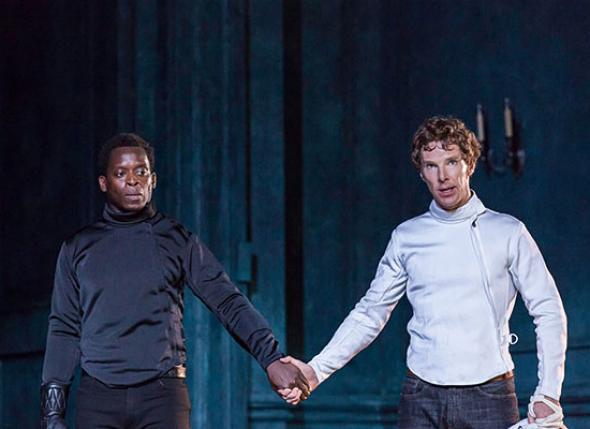At times in Lyndsey Turner’s production of Hamlet, the hottest London theater ticket in at least a decade, Benedict Cumberbatch is suddenly spotlighted. The actors around him, now dimly lit, remain onstage but move in pronounced slow motion, choreographed by the show’s movement director, Sidi Larbi Cherkaoui. Cumberbatch turns to the audience and delivers one of Hamlet’s soliloquies. After he has finished, minutes have passed for us but only moments have passed for the characters onstage. What we have just heard is a flood of Hamlet’s thoughts—and Hamlet is a character saturated by thoughts—that occurred to him in an instant.
If you’re a fan of Cumberbatch and his TV show Sherlock—and, it’s clear from the response in the house, most of the audience members in the Barbican are—the onstage treatment of those monologues will sound very familiar. It’s a carefully choreographed theatrical re-creation of the trademark moments in Sherlock when he pauses and text flashes across the screen too fast to read. The other characters fall away as Sherlock’s eyes dart and his rapid mind assimilates and analyzes information at a speed beyond the “funny little brains” of those around him.
The slow-motion scenes are a clever way of satisfying those members of the audience who have bought tickets in order to see their beloved Sherlock onstage. They also, unfortunately, ensure that Cumberbatch is too overloaded with external impedimenta to give us the superb Hamlet he is clearly capable of creating. If there is a character in English literature as weighed with the baggage of previous performances as Hamlet, it is Sherlock Holmes, and sometimes Turner asks Cumberbatch to play both at once. His performance is one of the most impressive Hamlets I have seen, but it is not one of the best. The reason it impresses and the reason it disappoints are the same: Cumberbatch has so much to cope with besides Shakespeare’s text.
This production is designed to bring film and TV fans into the theater and to make them feel comfortable once they are there. It does so not just by casting a film and TV superstar but by offering a huge cinematic spectacle filled with music, sound effects, special effects, high-concept costumes, and an astounding set by Es Devlin. Besides her credits in theater, opera, and dance, Devlin is known for designing the closing ceremony of the London 2012 Olympics along with concert tours by Kanye West, Lady Gaga, Miley Cyrus, and U2. The result is a stage production that feels like a movie—one that makes sure the audience feels they’ve gotten their money’s worth, but that places enormous obstacles in its star’s path.
No other screen star who has taken a break to act Hamlet onstage—not Ralph Fiennes nor Jude Law nor David Tennant—had to cope with playing the part in the middle of an extravaganza that looked ready for an arena tour. But Cumberbatch does. In person, his star quality is unmistakable, even breathtaking. He draws the eye whenever he is onstage, and whenever he is not onstage we wish he were. But even Cumberbatch can’t climb high enough above the razzamatazz around him to give us the clear view we need to see a truly brilliant Hamlet.
Later in its run, as is increasingly common for major stage productions, Hamlet will be broadcast in movie theaters. After that, inevitably, will be a video release. This is not just a stage production influenced by cinema: It is one ultimately intended to be consumed as cinema, too. This is Shakespeare as blockbuster, and the immutable law of blockbusters is that whatever proves financially successful in one is soon imitated, and exaggerated, in the next.
Will Hamlet be successful? That question was settled long ago; it sold out in minutes a year before it opened and tickets are being scalped for extortionate prices. That suggests a strange future for A-list actors in which blockbuster-style Shakespeare productions become blockbuster-style box office successes but, ironically, prevent them giving genuinely great Shakespearean performances.
